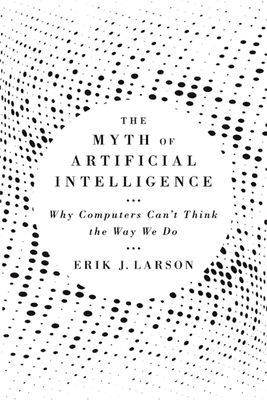

 Belknap Press
Belknap Press
The Myth of Artificial Intelligence: Why Computers Can't Think the Way We Do


Key Metrics
- Erik J Larson
- Belknap Press
- Hardcover
- 9780674983519
- 8.3 X 5.7 X 1.2 inches
- 1.01 pounds
- Technology & Engineering > Social Aspects
- English
 Secure Transaction
Secure TransactionBook Description
A cutting-edge AI researcher and tech entrepreneur debunks the fantasy that superintelligence is just a few clicks away--and argues that this myth is not just wrong, it's actively blocking innovation and distorting our ability to make the crucial next leap.
Futurists insist that AI will soon eclipse the capacities of the most gifted human mind. What hope do we have against superintelligent machines? But we aren't really on the path to developing intelligent machines. In fact, we don't even know where that path might be.
A tech entrepreneur and pioneering research scientist working at the forefront of natural language processing, Erik Larson takes us on a tour of the landscape of AI to show how far we are from superintelligence, and what it would take to get there. Ever since Alan Turing, AI enthusiasts have equated artificial intelligence with human intelligence. This is a profound mistake. AI works on inductive reasoning, crunching data sets to predict outcomes. But humans don't correlate data sets: we make conjectures informed by context and experience. Human intelligence is a web of best guesses, given what we know about the world. We haven't a clue how to program this kind of intuitive reasoning, known as abduction. Yet it is the heart of common sense. That's why Alexa can't understand what you are asking, and why AI can only take us so far.
Larson argues that AI hype is both bad science and bad for science. A culture of invention thrives on exploring unknowns, not overselling existing methods. Inductive AI will continue to improve at narrow tasks, but if we want to make real progress, we will need to start by more fully appreciating the only true intelligence we know--our own.
Author Bio
Erik J. Larson is a computer scientist and tech entrepreneur. The founder of two DARPA-funded AI startups, he is currently working on core issues in natural language processing and machine learning. He has written for The Atlantic and for professional journals and has tested the technical boundaries of artificial intelligence through his work with the IC2 tech incubator at the University of Texas at Austin.
Source: Harvard University Press and Linked In
Videos
No Videos
Community reviews
Write a ReviewNo Community reviews